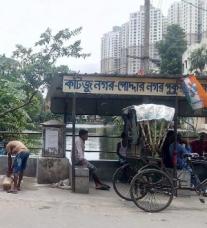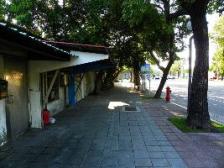
By Mousumi Gupta
The only man in the world to be struck by lightning seven times was ex-park ranger Roy C. Sullivan. Kami Rita Sherpa. 22 times climbed Mount Everest. These are records ...
By Mousumi Gupta
The only man in the world to be struck by lightning seven times was ex-park ranger Roy C. Sullivan. Kami Rita Sherpa. 22 times climbed Mount Everest. These are records from Guinness book. But here is someone, though not featured in Guinness book, our member Mrs. Ranju Hore, peculiarly, used to get lost over and over again.
“I was about 5/6 years old then when I was lost in Kolkata roads. I came to Kolkata to attend wedding of one of my relatives. When everyone was busy, I thought of going around and have a look at the city. At that age it was merely a fun going out somewhere without elders in the family. The fun turned out to a nightmare for me when I realized that I couldn’t find my way back to my uncle’s house. It was almost evening and I was feeling extremely tired and hungry. At last I saw two policemen. I approached them and narrated my sad saga. They offered me food and helped me to reach my uncle’s place.” That was only the beginning. She got lost several times in Gariahat market while shopping with her daughter. However by that time she became smart enough to take help from the local people to come back home. Now the latest one. Last year during September-October she went to visit one of her relative to Mississauga, a city neighboring Toronto with her elder brother. Both the siblings after few days of morning walk, thought that they were aware of the streets and parks. One evening when her brother asked her to join at a park, she was confident enough to reach that park without any hassle. She walked for about 15-20 minutes in almost freezing temperature in the dark roads. She could neither find the park nor the house where they were staying and she was lost again. After about half an hour trying to seek help, a kindhearted person helped her back home. “Fortunately, I could remember the address”, she giggled.
Well, that’s what life is all about. You make funny slipups in the past and enjoy the incidents in your safe and sound present, not knowing such mistakes may occur in the future also.
Want to share your experience? Please mail your story to writetous@supportelders.com with your name

Our member, Mr Sushil Ghosh, shares his memories of Aiken, Germany, where he went for his higher studies in structural engineering, with Mousumi Gupta. Our member, Mr Sushil Ghosh, shares his memories of Aiken, Germany, where he went for his higher studies in structural engineering, with Mousumi Gupta. Mr Ghosh fondly remembers his university days and the winter holidays when his friends’ families took turns to invite foreign students to spend five days during Christmas with them. After completing graduation in science, he joined as a research scholar in Maithon Dam project, where he came very close to a German mechanical engineer working there. Mr Ghosh expressed his wish to go to Germany for higher studies. Somehow, the German engineer felt that Mr Ghosh had the capability to do better in life but said “You have to appear for an exam and get selected and then can go there with scholarship.” He took it as a challenge and appeared for the entrance exam, got selected and landed in a small university town in Germany named Aiken. “Landing up there is one thing but getting to know the language was a big problem for all the foreign students as the lectures used to be all in German,” recalls Mr Ghosh. “I used to sleep in the class as I didn’t know even a bit of the language.” A girl in the class, with little knowledge of English, helped him get the class lectures translated into English. The practical-oriented approach helped him cope with his studies in the beginning. Within a short span of time, Mr Ghosh learnt the language and started to converse. During Christmas holidays, the families there would invite them to spend five days with them. That was an initial understanding about their culture, tradition, behaviorism and importance of families in their lives during Christmas. The absolutely different variety of food preparation, participation of every family member in decorating the newly bought Christmas trees-all that was very exciting for him. Even the hosts used to be very proud to let their relatives know that an Indian came to stay with them. He gradually learnt customs and adjusted his lifestyle. He was also invited to Helsinki and Stockholm during Christmas to some of his friends’ houses. Though he worked and stayed in the UK for 35 years, but the “colourful life” according to him and the memories of Aiken are very close to his heart. Pic credit: https://pixabay.com/photos/germany-landscape-scenic-church-103160/ Want to share your experience? Please mail your story to writetous@supportelders.com with your name

Our member, Mr Brajadish Das, shares the story behind his family’s flight from Bangladesh and settling in south Kolkata’s Katjunagar, with Mousumi Gupta.
<...
Our member, Mr Brajadish Das, shares the story behind his family’s flight from Bangladesh and settling in south Kolkata’s Katjunagar, with Mousumi Gupta.
Our member, Mr Brajadish Das, shares the story behind his family’s flight from Bangladesh and settling in south Kolkata’s Katjunagar, with Mousumi Gupta.
Kolkata (then Calcutta) was unprepared for the rush of refugees, who had crossed the newly drawn borders at the time of and after Independence. The journey for the people of then East Bengal or East Pakistan, now Bangladesh, was one-way because they never went back.
Like many others, I left Bangladesh when I was about 12 years old with my mother and siblings. My father was already in Kolkata working with Mackinnon Mackenzie & Co.
Living in the cramped ‘mess bari’ or rented rooms was entirely different from staying at our ‘desher bari’ (country home). But after the Partition, the educated middle-class flocked to Kolkata because they knew the city had the best chance to find their feet. Instead of waiting passively for government help, they began to rehabilitate themselves in and around Kolkata. The old boundaries of the city suburbs were pushed back to accommodate the wave of added population.
Things were not different for us also. Then we came to know about this locality which had an absentee landowner. The area was an army barrack during World War II, but they left post-war. The houses had thatched roofs made out of hogla leaves available in Jadavpur. Slowly, those were converted to concrete houses with basic amenities like water, electricity and wide roads.
Once the basic requirements were fulfilled, we started thinking about other important things like getting postal address. For an address, we needed a name. So, the entire locality unanimously decided to name it after then West Bengal Governor Dr Kailash Nath Katju.
The funny part of naming it as Katjunagar came from the thought that if any untoward thing happened, it would hit the headlines in the next day’s newspaper, which no one would dare do. Though nothing happened, that is how the area got its name. Now, whenever I stroll in the locality, the history of the area flashes in my mind.
Want to share your experience? Please mail your story to writetous@supportelders.com with your name

Mr Manas Banerjee, the husband of our member, Ms Bharati Banerjee, shares his love for the tea leaf and his experience of working in tea gardens, with Mousumi Gupta<...
Mr Manas Banerjee, the husband of our member, Ms Bharati Banerjee, shares his love for the tea leaf and his experience of working in tea gardens, with Mousumi Gupta.
Mr Banerjee pursued his passion for plants from the world-renowned Tocklai Tea Research Institute in Jorhat, Assam. He then worked with several tea gardens as an expert to check the health of tea plants.
Age is hardly a factor for Mr Banerjee, who is almost touching 80. The enthusiastic gentleman thinks that everyone has to be active in whatever way they can, be it working or listening to music or simply reading books. He visits different tea estates in the Northeast regularly to check the health of this plantation crop.
In Mr Banerjee’s eyes, the growth of a tea bush is very similar to that of a human being. Asked about the longevity of a tea plant, he said: “It also resembles that of a human. As we can keep ourselves majorly active till 60, and after that work productivity dips, tea plants also follow a similar pattern. One has to take real care about the plantation, as it needs extreme care in terms of soil, water and the drainage system apart from the processing of buds into tea leaves. Like human beings, tea saplings stay in the nursery till they attain 10 to 12 months of age or 18 inches in height before being transplanted to the actual site.”
“The pH value of the soil has to be between 4.5 and 4.7. Anything more than that would increase the aluminum content in tea, which makes it harmful for humans. Tea plants are self-sterile and have to be cross-pollinated.”
Asked about the height of a tea plant, he said: “It depends on the height of the tea plucker so that it becomes easy for her to pluck. So, in India, the height is nearly 40 inches but in Africa, it is much taller.”
“Tea pluckers all across the world are majorly women,” he said, and it is only because women pluck buds and leaves with motherly care, which is very important for further growth.
Mr Banerjee gave insights into the benefits of tea. For example, it reduces anxiety. “In this stressful world, people, instead of taking medicines, try to search for some cure from natural sources. Tea, particularly varieties like green and chamomile, actually reduces anxiety. It has some other medicinal values. It treats constipation, nausea, cures cough and helps keep fever at bay.”
Mr Banerjee’s lifelong love for this magical green leaf, which holds a major part of India’s export, shows in his eyes as he speaks about his experience with tea.
Want to share your experience? Please mail your story to writetous@supportelders.com with your name

Our member, Ms Pushpa Chatterjee, shares fond memories of her stay in Taipei's Shilin district, with Mousumi Gupta.
Ms Pushpa Chatterjee’...
Our member, Ms Pushpa Chatterjee, shares fond memories of her stay in Taipei's Shilin district, with Mousumi Gupta.
Ms Pushpa Chatterjee’s husband was a scientist in NASA (The National Aeronautics and Space Administration) during the launch of Apollo 15 in 1971. Apollo 15 was the ninth crewed mission in the United States’ Apollo programme, the eighth to be successful, and the fourth to land on the moon.
Her eyes lit up when she spoke about her husband, who had several achievements to his credit. Ms Chatterjee recalled her experiences of staying in different parts of the world.
But the one, which occupies a special corner in her heart, is their stay in Shilin district of Taipei.
“My husband got a chance in mentoring a couple of research students in Shilin district of Taipei after he came back to India. It was a five-year tenure and I accompanied him, because by then our son and daughter had got married and settled in the US.”
“Shilin is a small sleepy hilly town in the suburbs of Taipei, the capital of Taiwan, with its marvellous natural scenery still fresh in my mind. With rain dominating almost nine months a year, we looked forward to sunshine. Language was the major barrier for us there and we had to act and make gestures every time we needed to buy anything from the shops,” reminisced Ms Chatterjee.
“Once to buy sugar, we had to take a glass to the shop and stir the water inside to make them understand,” she said, giggling.
Ms Chatterjee recalled: “But we were astounded to see how hardworking they were, especially the women. There had no helping hands to do the household chores. The women used to go for work with their kids slung from their backs yet climb the hills effortlessly. There were any shopping malls at that time, forcing us to depend on the neighbourhood shops, run out of the residential houses. The male members used to run it mainly but in their absence, the women took over.”
Speaking about Shilin’s beauty, Ms Chatterjee said: “It boasts of many famous scenic spots and historic sites such as Chiang Kai-Shek official residence. I still vividly remember how the guards would stand without blinking their eyes for eight hours in front of Chiang Kai-Shek’s enormous statue. There is a change of guard every eight hours, which is a spectacular sight to watch. The district is home to many museums, including the world famous National Palace Museum.”
Speaking about the local culture, Ms Chatterjee said: “Dragon Dance during the Chinese New year reflects another vibrant side of Taipei. A team of nine performers typically control the dragon, nine being the auspicious number for the Chinese. Each of the vibrant colours depict various things, starting from harvesting to excitement to prosperity.”
“Most people in Shilin or Taipei were lean and thin. They mostly survive on soup and fish. She liked the wanton soup prepared by searing the octopus and squids in hot boiling water with some sizzling. Due to persistent rain, the paddy was short in size and round in shape. Though rice was the staple food for the people there, they never took rice on their menu when they went to a restaurant. They used to have several whole fish dishes (cutting fish is inauspicious in Chinese culture), variety of meat dishes but no rice,” recalled Ms Chatterjee.
“The salubrious weather, friendly and simple people, interesting culture, their joint family set-up everything is still fresh in my mind,” she said.
Pic credit: https://commons.wikimedia.org/wiki/File:Melin_Village_Bus_Stop_in_Shilin_District,_Taipei_20131010.JPG
Want to share your experience? Please mail your story to writetous@supportelders.com with your name

